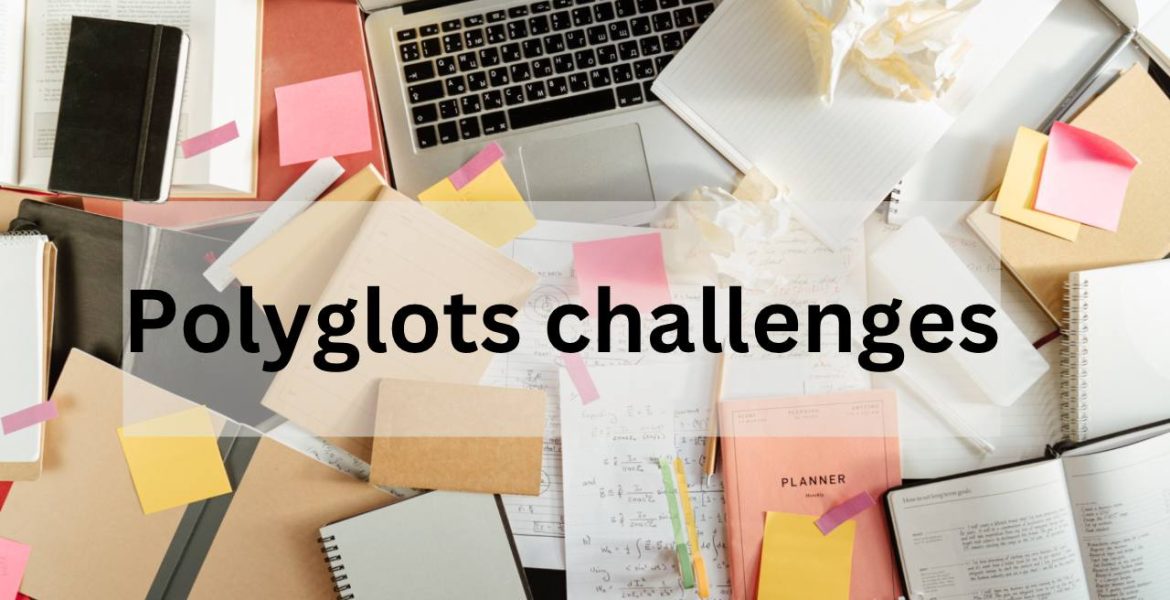Challenges That Polyglots May Face
1402-05-14 1404-05-11 14:18Challenges That Polyglots May Face
(ویژه سومین کنفرانس چند زبانههای ایران )
Abstract
Polyglots are individuals who are proficient in speaking multiple languages. While
their skill in languages is often admired, but polyglots may face unique challenges in
their language-learning journey. This article explores some of the challenges that
polyglots may face, including language interference, maintaining proficiency, and
staying motivated. By examining these challenges, we can gain a better
understanding of the complexities of language learning and the dedication required
.to become a successful polyglot
Introduction
Polyglots are often seen as language learning prodigies, effortlessly speaking
multiple languages with ease. However, the reality is that polyglots face unique challenges that come with learning and maintaining multiple languages. One of the
most common challenges is language interference, where the structures and vocabulary of one language may interfere with another, leading to errors or
confusion. Additionally, polyglots may struggle with maintaining proficiency in all
their languages, particularly if they do not have the opportunity to practice regularly. Finally, staying motivated to continue learning and improving in multiple languages can be a challenge in itself.
Language Interference
Language interference occurs when the structures and vocabulary of one language interfere with another. This can be particularly challenging for polyglots who a learning languages that are similar in structure or vocabulary. For example, a polyglot who is fluent in both Spanish and Italian may accidentally use a Spanish
word or phrase while speaking Italian, or vice versa. This can lead to confusion and errors in their communication. To overcome this challenge, polyglots can focus on the differences between the languages they are learning. By paying attention to the unique aspects of each language, they can reduce the chances of making mistakes or confusing the languages. They can also practice using each language in a variety of contexts to help solidify their understanding of the unique grammar rules and vocabulary.
Maintaining Proficiency
Maintaining proficiency in multiple languages can be challenging, particularly if
polyglots do not have the opportunity to practice regularly. To maintain their
proficiency, polyglots often try to use all their languages on a regular basis. This
can include reading books, watching movies, or speaking with friends or family
members who speak the language. Another strategy that polyglots use is to create a language learning schedule. By
setting aside dedicated time each day or week to practice each language, they can
ensure that they are consistently improving their skills. Additionally, they can seek
out language exchange programs or hire a language tutor to practice speaking with a native speaker on a regular basis.
Staying Motivated

Staying motivated to continue learning and improving in multiple languages can
be a challenge in itself. Polyglots may experience burnout or frustration if they feel
like they are not making progress in one or more of their languages. To stay
motivated, polyglots often set specific goals for each language they are learning.
For example, they may aim to reach a certain level of proficiency or to be able to
have a conversation with a native speaker. Polyglots join language learning communities. By connecting with other language learners, they can share tips and strategies, practice speaking with others, and find support and encouragement. Additionally, they can try to make language learning fun and engaging by incorporating activities they enjoy, such as reading books or watching movies in the target language.
Overall, while polyglots may face unique challenges in their language learning
journey, they can overcome these challenges by using various strategies and
developing a dedicated language learning routine. By continuing to expand their
linguistic abilities, polyglots can reap the many benefits of being proficient in
.multiple languages and connect with people from all over the world
Improved Cultural Understanding
Being proficient in multiple languages allows polyglots to connect with people
from different cultures and gain a deeper understanding of their perspectives and
experiences. By learning another language, polyglots are able to communicate
more effectively with people from different backgrounds and appreciate the
nuances of different languages and cultures. They may also be able to better
understand cultural references and idiomatic expressions, which can enhance their cross-cultural communication skills.
Increased Career Opportunities
Being proficient in multiple languages can open up many career opportunities, particularly in fields such as international business, diplomacy, and translation.
Polyglots may be in high demand for jobs that require interaction with people from
different cultures or regions, and they may also be able to negotiate higher salaries due to their unique skill set. Boosted Cognitive Function Studies have shown that learning and speaking multiple languages can improve cognitive function and brain development. Polyglots may have stronger memory, problem-solving skills, and attention span due to the constant mental exercise of switching between languages and managing different sets of grammar rules and vocabulary.
Improved Travel Experiences Being proficient in multiple languages can make traveling to different countries much easier and more enjoyable. Polyglots can communicate with locals more easily, navigate unfamiliar places, and gain a deeper understanding of the places they visit. They may also be able to connect with people more effectively and avoid misunderstandings or cultural faux pas.
Personal Growth
Learning and speaking multiple languages can be a challenging and rewarding
experience that can help polyglots grow personally and develop greater
self-confidence and resilience. It can also be a fun and creative way to express
themselves and connect with others who share their interest in language learning.
All in all, the benefits of being a polyglot are many and varied. From improved
cultural understanding to increased career opportunities and boosted cognitive
function, polyglots have a unique set of skills that can enhance their personal and
professional lives. By continuing to learn and practice multiple languages, they can
expand their horizons and connect with people from all over the world
Improved Communication Skills
Being proficient in multiple languages can improve communication skills in
general, not just with people who speak those languages. Polyglots often have an
enhanced ability to express themselves, understand others, and adapt to different
communication styles. This can be a valuable asset in any personal or professional
setting.
Enhanced Creativity

Learning and speaking multiple languages can also enhance creativity. Polyglots
may be able to express themselves in unique ways, and they may be able to
approach problems or situations from different angles due to their ability to think in
multiple languages. This can be particularly useful in fields such as writing, art,
.and design
Increased Social Opportunities
Being proficient in multiple languages can also increase social opportunities.
Polyglots may be able to connect with people from different cultural backgrounds,
attend language exchange events, and participate in cultural events or festivals.
This can lead to a richer and more diverse social life, as well as the opportunity to
.make new friends and connections
Improved Memory
Learning and using multiple languages can also improve memory. Polyglots may
have better working memory, which is the ability to hold and manipulate
information in the mind over short periods of time. They may also have better
long-term memory due to the constant mental exercise of switching between
.languages and managing different sets of grammar rules and vocabulary
Reduced Risk of Cognitive Decline

Studies have also shown that being proficient in multiple languages can reduce the risk of cognitive decline in later life. Polyglots may be less likely to develop
conditions such as dementia or Alzheimer’s disease, and may have better cognitive function as they age.
In brief, being a polyglot can provide many benefits both personally and professionally. From improved communication skills to enhanced creativity and
social opportunities, polyglots have a unique set of skills that can enrich their lives
in many ways. By continuing to learn and practice multiple languages, they can
.Continue to reap the benefits of being proficient in multiple languages
Increased Empathy
Learning and speaking multiple languages can also increase empathy. Polyglots
are often exposed to different cultures and perspectives, which can foster greater
understanding and empathy for others. This can be particularly valuable in
.professions such as healthcare, education, and social work
Improved Problem-Solving Skills
Polyglots often have an enhanced ability to think critically and solve problems.
They may be better able to identify and analyze complex issues due to their ability
to understand and communicate in multiple languages. This can be a valuable asset
in fields such as business, law, and engineering.
Being proficient in multiple languages can also improve adaptability. Polyglots
may be better able to adapt to new situations, environments, and cultures due to
their ability to understand and communicate in different languages. This can be
particularly useful for those who travel frequently or work in international settings
Increased Tolerance for Ambiguity
Learning and speaking multiple languages can also increase tolerance for
ambiguity. Polyglots are often exposed to different grammar rules, vocabulary sets,
and cultural norms, which can help them become more comfortable with uncertainty and ambiguity. This can be particularly useful in fields such as research, science, and technology.
Enhanced Personal Growth
Being a polyglot can also enhance personal growth. Learning and speaking
multiple languages can be a challenging and rewarding experience that can help
polyglots develop greater self-confidence, resilience, and mental flexibility. It can
also be a fun and engaging way to explore different cultures and express oneself
.creatively
To sum up, the benefits of being a polyglot are many and varied. From increased
empathy and adaptability to improve problem-solving skills and personal growth,
polyglots have a unique set of skills that can enhance their personal and
professional lives. By continuing to learn and practice multiple languages, they can
.expand their horizons and connect with people from all over the world
Increased Confidence

Learning and speaking multiple languages can increase confidence, both in
personal and professional settings. Polyglots may feel more comfortable
communicating with people from different cultures and backgrounds, and maybe
more willing to take risks and try new things due to their ability to adapt to
.different situations and environments
Enhanced Cultural Sensitivity
Being proficient in multiple languages can also enhance cultural sensitivity.
Polyglots are often exposed to different cultural norms, beliefs, and practices,
which can help them become more aware of and sensitive to cultural differences.
This can be particularly valuable in fields such as international relations, education, and social work.
Improved Linguistic and Cognitive Flexibility
Learning and speaking multiple languages can improve linguistic and cognitive
flexibility, or the ability to switch between different languages and thought
processes. Polyglots may be better able to process and interpret information in
different languages, and may be more open to new ideas and perspectives due to
their exposure to different cultures and languages
Increased Sense of Belonging
Being proficient in multiple languages can also increase a sense of belonging and
connection to different communities and cultures. Polyglots may feel more
comfortable and connected when traveling or living in different countries, and may
be able to form deeper connections with people from different backgrounds due to
.their ability to communicate in their native language
Improved Creativity and Innovation
Learning and speaking multiple languages can also enhance creativity and
innovation. Polyglots may be able to approach problems or situations from
different angles, and may be more open to new ideas and perspectives due to their
exposure to different cultures and languages. This can be particularly valuable in
.fields such as art, design, and technology
To put it simply, being a polyglot can provide many personal and professional
benefits. From increased confidence and cultural sensitivity to improved cognitive
flexibility and creativity, polyglots have a unique set of skills that can enrich their
lives in many ways. By continuing to learn and practice multiple languages, they
.can continue to reap the benefits of being proficient in multiple languages
Results
Polyglots may face challenges that are not present for monolingual individuals,
including language interference, maintaining proficiency, and staying motivated.
Language interference occurs when the structures and vocabulary of one language interfere with another, leading to errors or confusion. Polyglots may also struggle with maintaining proficiency in all their languages, particularly if they do not have the opportunity to practice regularly. Finally, staying motivated to continue learning and improving in multiple languages can be a challenge in itself.
However, by recognizing these challenges, polyglots can develop strategies to
overcome them and continue to expand their linguistic abilities. To overcome these challenges, polyglots can use various strategies. For example, they can focus on the differences between the languages they are learning to reduce
language interference. They can also set aside dedicated time each day or week to practice each language and use all their languages on a regular basis to maintain proficiency. Finally, they can set specific goals for each language they are learning and join language learning communities to stay motivated.
References
– Cook, V. (2016). Second language learning and language teaching. Routledge.
– Grosjean, F. (2010). Bilingual: Life and reality. Harvard University Press.
– Paradis, M. (2004). A neurolinguistic theory of bilingualism. John Benjamins
Publishing.
– Wei, L. (2018). Multilingualism and translanguaging: Current trends in
sociolinguistics. Annual Review of Applied Linguistics, 38, 16-33.8
By: Nima Eradati

